The 13 best agentic AI companies to watch in 2025

Agentic AI is the #1 priority for businesses today, according to Gartner’s 2025 list of top strategic technology trends. Why? Agentic AI is the next evolution of enterprise automation—AI agents go beyond generating content, they take action.
Agentic AI, unlike AI conversational chatbots, can execute complex workflows connecting to systems, make autonomous decisions, and carry out multi-step tasks with minimal human input. This new generation of AI unlocks entirely new possibilities.
In this guide, we’ll examine 13 agentic AI companies currently leading the way with top-performing AI agents. From startups building specialized agent frameworks to enterprise AI agent platforms for AI customer service, we’ll explore the standout features and strengths of each to help you find the right AI agent platform for your unique business needs.

8 major support hassles solved with AI agents
Review of 13 top agentic AI companies (2025)
1. Sendbird
Sendbird’s AI agent platform helps support teams deliver proactive, personalized, and conversational customer service across channels — including in-app, websites, proactive chat, SMS, WhatsApp, and email.
The no-code AI agent builder makes it easy for non-technical teams to create and custom-train AI agents on your company’s knowledge base, policies, and support playbooks, then optimize their performance to unique workflows.
Sendbird integrates seamlessly with your existing support stack and AI tools, ensuring a smooth human handoff and a unified view of customer insights. With an intuitive AI agent dashboard and robust analytics, teams get full visibility into agents’ interactions and performance so they can continuously optimize the customer experience.
Built on enterprise-grade communications infrastructure that serves 300 million monthly active users, Sendbird is designed for enterprises that want performance without sacrificing scalability, compliance, and security—including for B2B customer service.
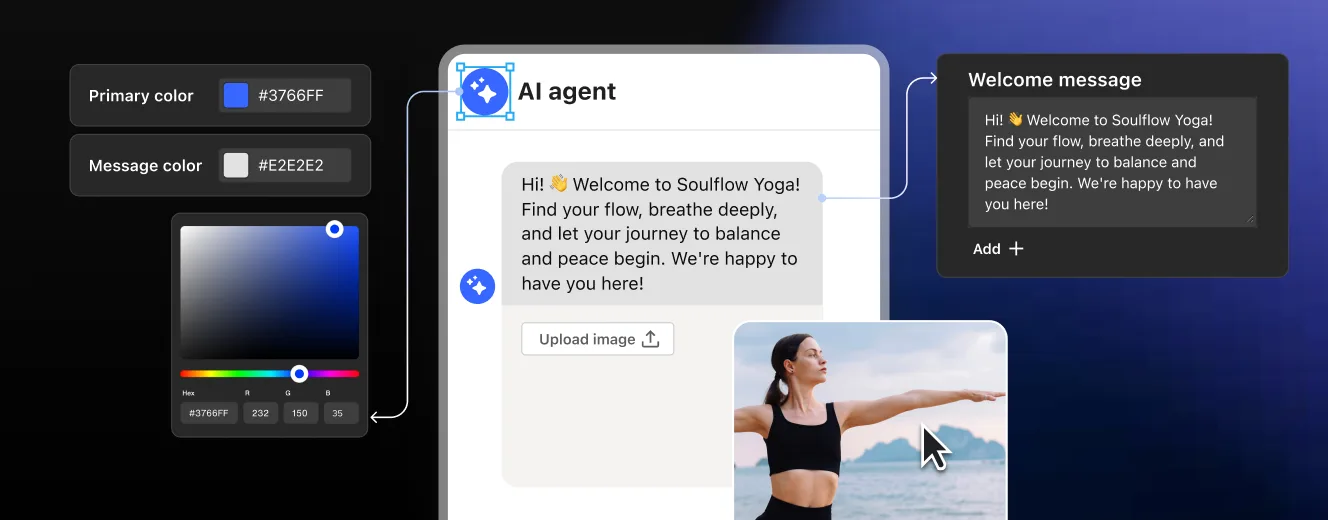
Key benefits and features
Fast and easy AI agent building, testing, evaluation, and safeguarding—no coding required
Integrates with support platforms and knowledge bases you already use
Omnichannel by default: provide AI for customer support via app, SMS, WhatsApp, email, and web conversations
Built on secure, compliant infrastructure with enterprise-grade scalability
Dedicated white-glove onboarding and professional services available from proof-of-concept to deployment
Multi-locale support and localization
Best for
CX leaders, support teams, and digital transformation owners looking to reduce ticket volume, and boost CSAT scores with AI agents that scale seamless, tailored support across channels.

Leverage omnichannel AI for customer support
2. Cognition Labs
Cognition Labs builds autonomous AI agents for software engineering, focusing on enterprise-grade performance and security. Its AI agent Devin can plan tasks, write code, run tests, debug, and deploy software with minimal oversight.
Devin AI operates in a real development environment and integrates with tools like GitHub, Slack, and CI/CD pipelines to mirror human workflows. Devin can also be deployed in a Virtual Private Cloud (VPC), ensuring full control over data and compliance. Advanced features like MultiDevin allow organizations to manage parallel agents, delegate large backlogs, and automate event-based incidents.
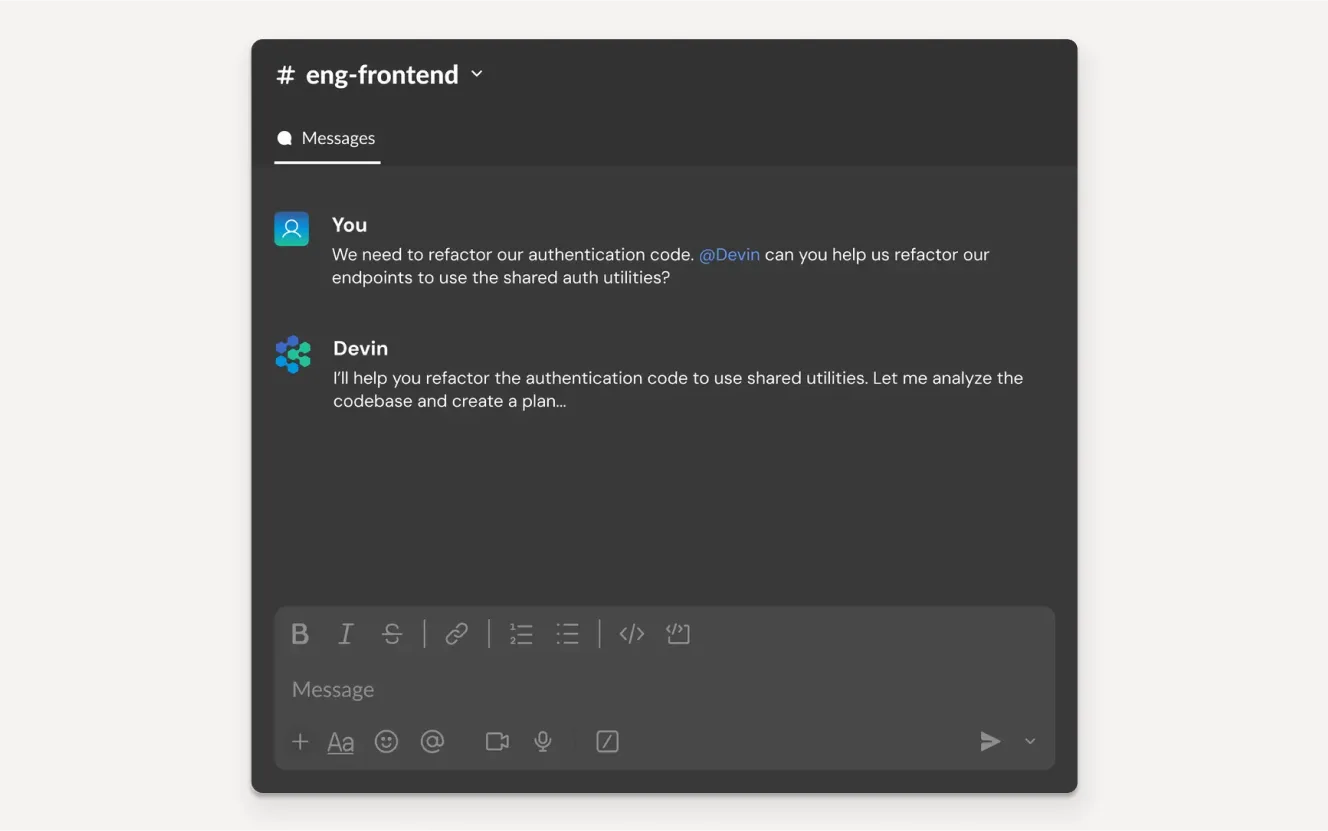
Key benefits and features
Devin AI is an autonomous software engineer that can plan, code, test, and deploy solutions end-to-end
Operates in a full developer environment to mirror real engineering workflows
The enterprise version supports deployment in a Virtual Private Cloud (VPC)
Includes advanced capabilities like MultiDevin for parallel task execution and event-driven automation
Custom Devins can be fine-tuned for specific engineering tasks and datasets to align with internal tools and processes
Best for
Enterprise engineering teams looking to automate development work at scale while maintaining complete control over data, deployment, and security.
3. Hippocratic AI
Hippocratic AI builds agentic healthcare technology to close the global healthcare staffing gap. Its AI agents assist with low-risk, non-diagnostic tasks traditionally performed by nurses, such as chronic care management, patient follow-ups, and wellness coaching.
Clinicians play an active role in developing these agents through Hippocratic AI’s Clinician Creator program. This initiative allows licensed healthcare professionals to train and deploy their own AI agents using the platform’s no-code AI Agent Trainer tool. Clinicians can also earn revenue by offering their agents through the Hippocratic AI App Store.
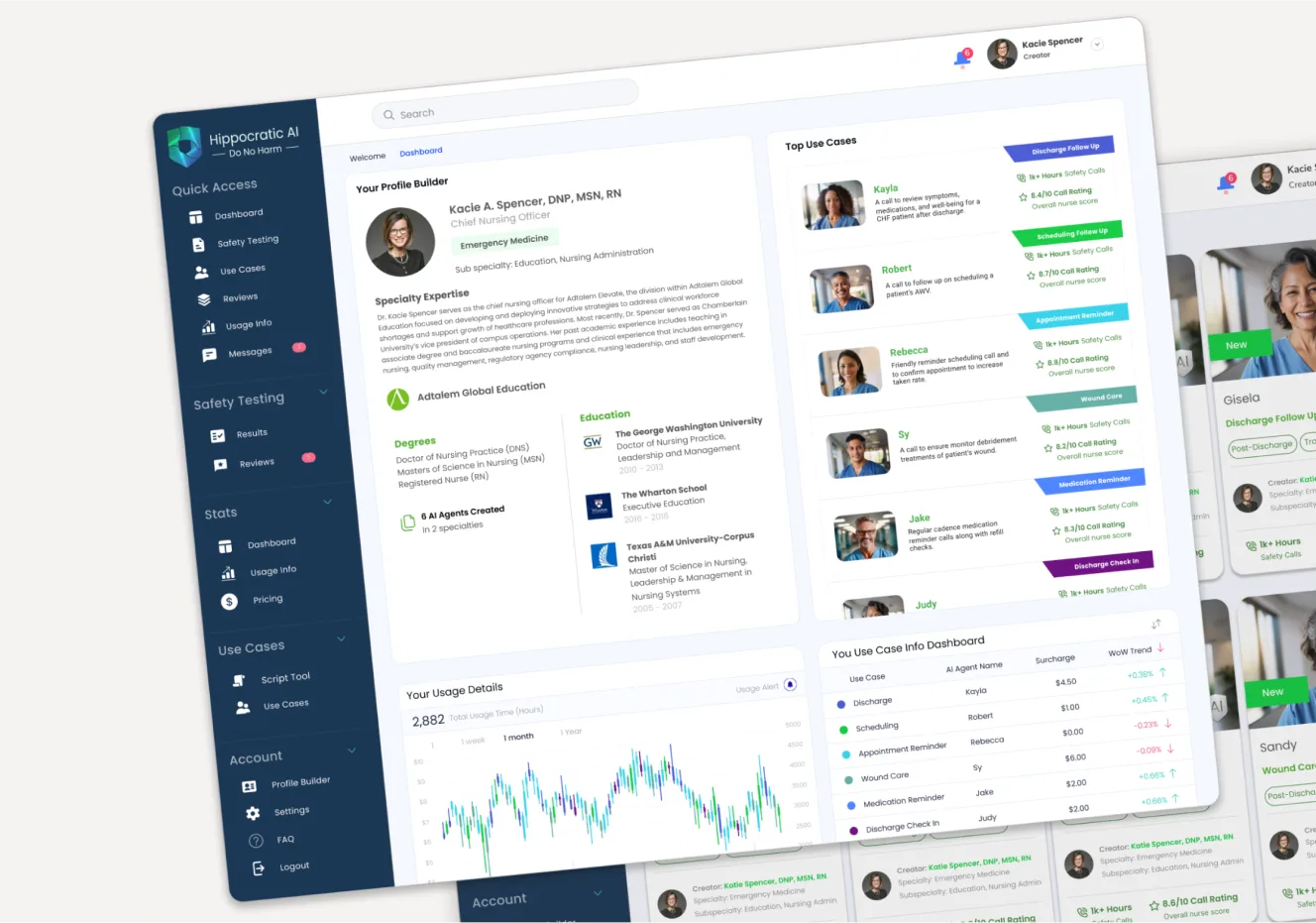
Key benefits and features
AI Agent App Store allows licensed medical professionals to create and publish healthcare agents
Designed for low-risk, non-diagnostic use cases such as care coordination and follow-up support
Supports a growing network of clinicians contributing through the Clinician Creator program
No-code Agent Trainer enables quick AI agent development and deployment
Built on a safety-focused LLM and patented safety architecture aligned with clinical standards
Best for
Health systems and digital health companies that want to scale clinical support roles safely and ethically by automating low-risk tasks with AI customer service agents designed by licensed medical professionals.
Learn more: 12 examples of AI in healthcare
4. UiPath
UiPath, best known for its robotic process automation (RPA) capabilities, is expanding into agentic AI. Its tools combine AI agents, software robots, and human input to orchestrate enterprise workflows across systems and departments. The platform supports a hybrid mix of low-code and pro-code environments, allowing teams to build, test, and manage agents at scale.
Features like Agent Builder and UiPath Maestro bring together AI agents, robots, and people to streamline complex workflows. With enterprise-grade access controls and support for third-party AI models, UiPath provides tools to help teams build automations suited to a range of business needs.
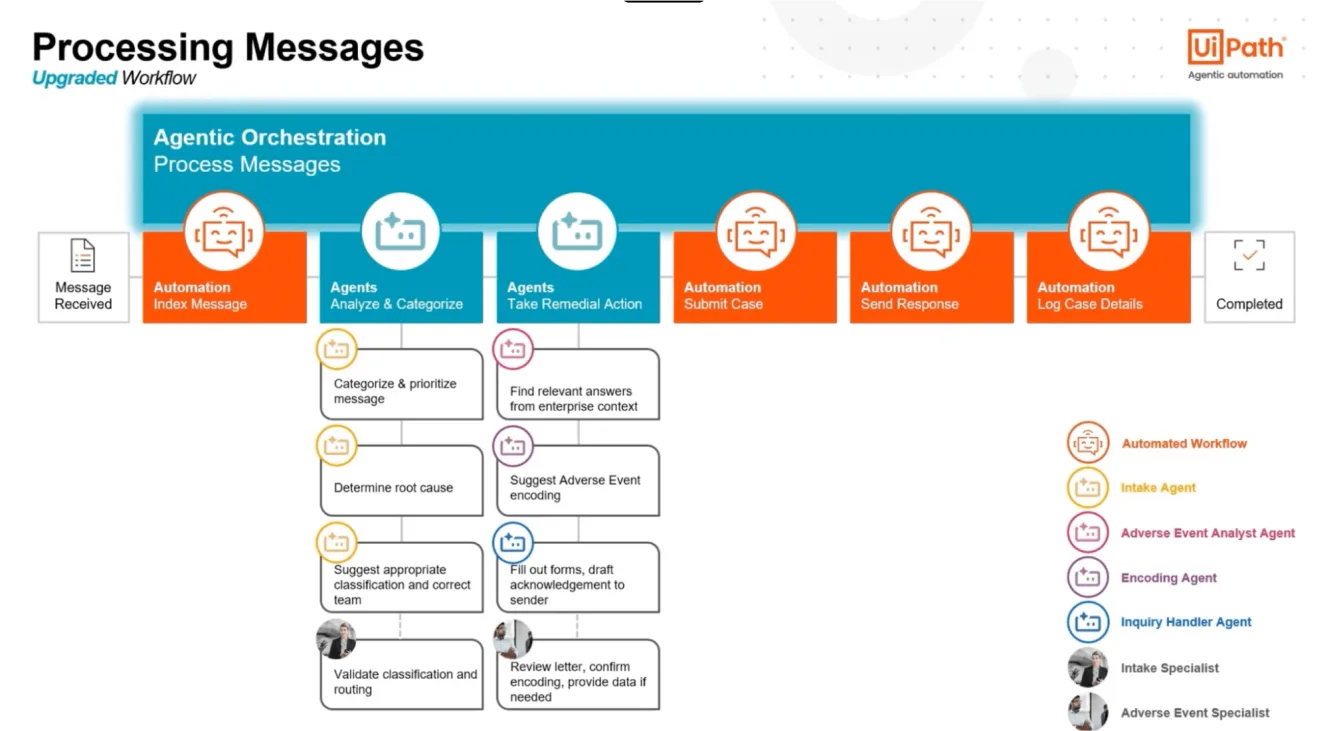
Key benefits and features
Agentic Automation Platform blends agentic AI, automation, and human input to orchestrate end-to-end workflows
Agent builder allows teams to create and deploy AI agents for complex processes.
Supports both low-code and pro-code environments to accommodate technical and non-technical teams
Integrates with third-party AI models and enterprise applications through APIs and intelligent document processing
Offers tools like UiPath Maestro, Autopilot, and Healing Agent to adapt, streamline, and scale enterprise automation
Best for
Enterprise teams that want to automate complex, cross-functional workflows using agentic AI, with AI support for governance, low-code development, and integration across existing systems.
5. MavenAGI
MavenAGI builds AI-powered customer support agents to deliver consistent service across every channel. Its Agent Maven™ generative AI solution integrates with your systems of record and supports omnichannel interactions.
Businesses can train and deploy agents using a no-code interface that customizes tone, teaches the agent from documentation, and enables custom actions for resolving common problems. MavenAGI also includes Maven Copilot, an internal-facing assistant that supports human agents by summarizing cases, suggesting solutions, and improving documentation over time.
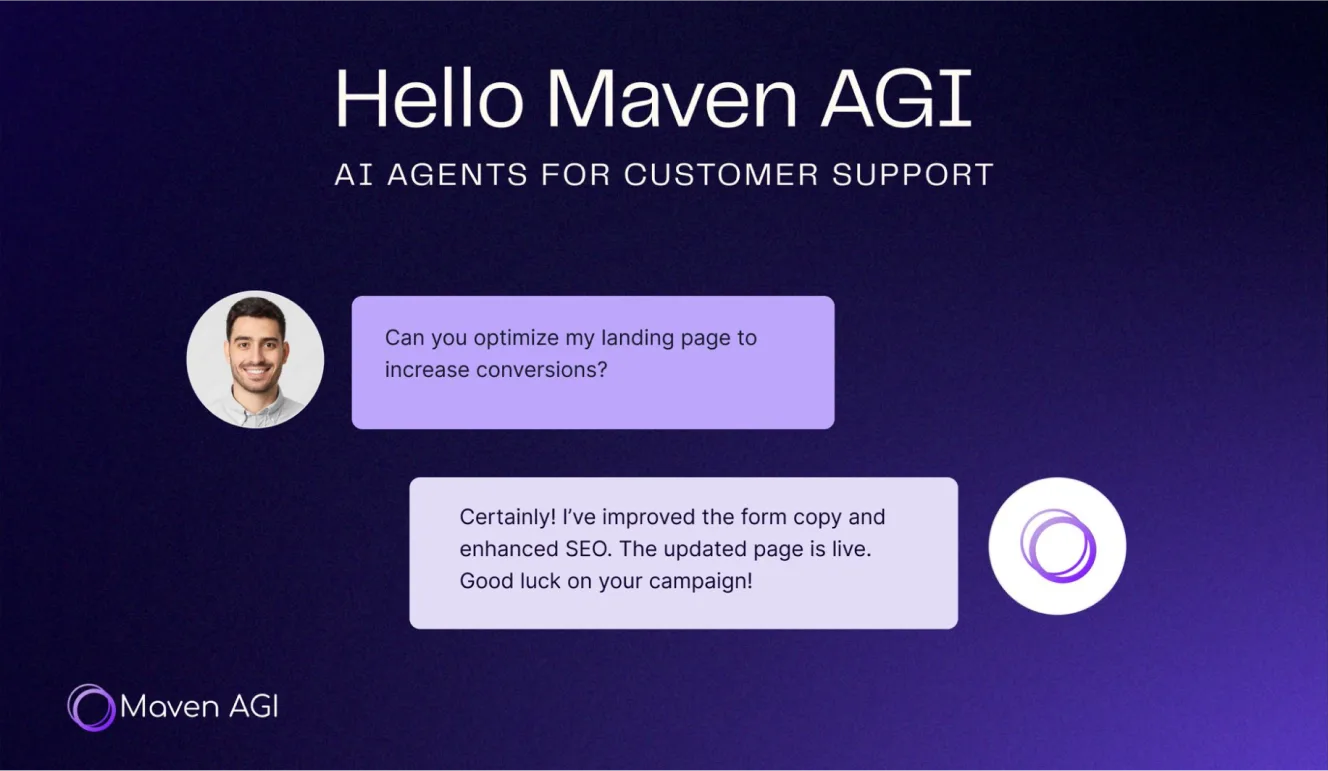
Key benefits and features
Agent Maven™ delivers multi-channel AI for customer service across SMS, chat, email, phone, and self-service
Lets teams build and train agents on tone, knowledge, and actions without writing code
Provides operational visibility, performance tracking, and system security for large-scale deployments
Maven Copilot assists human agents with summaries, suggestions, and documentation-building
Developer-friendly SDKs and APIs support custom integrations and platform expansion
Best for
CX teams at businesses that want to automate multi-channel customer support while maintaining control over brand voice, agent behavior, and performance insights.
6. Assistents.ai
Assistents.ai offers an enterprise-grade platform for building, training, and deploying autonomous AI agents across business functions. Designed for flexibility, the platform supports no-code workflows, pre-built templates, and customizable AI agents that align with your business data, systems, and needs.
Using the Assistens.ai AI agent development platform, teams can develop AI agents to automate high-reasoning tasks, adapt to changing inputs, and deliver real-time insights. Assistents.ai also supports complex workflow orchestration, integrating with tools like Zapier and Snowflake, and offers model-agnostic deployment to ensure performance across various use cases.
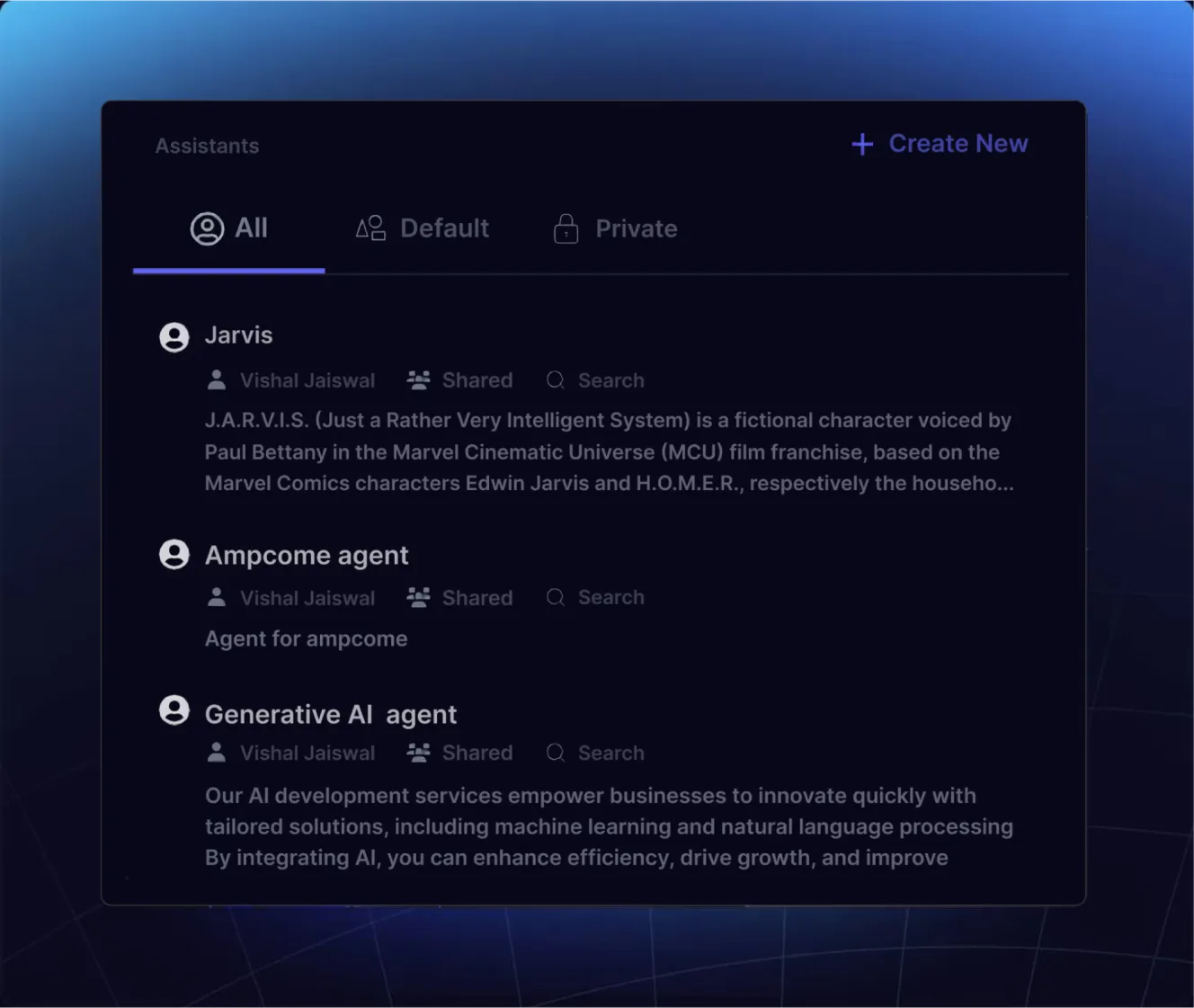
Key benefits and features
No-code platform with pre-built templates and full customization for business-specific agents
Supports complex workflow orchestration with advanced reasoning and decision-making
Seamless integration with existing tools via APIs, Zapier, and Snowflake
Built-in session analytics for tracking agent behavior and improving performance
Secure deployment options, including VPC, on-prem, and major cloud platforms
Best for
Organizations that want to automate business workflows, centralize knowledge, and build scalable AI systems with minimal technical lift and enterprise-level flexibility.
7. NinjaTech AI
NinjaTech AI offers a general-purpose agentic AI assistant that blends the capabilities of multiple AI models into a single, unified experience. Its SuperAgent system selects from more than 20 top-performing AI models to deliver high-quality results across research, writing, coding, and other tasks.
The platform also emphasizes affordability and speed, powered by next-generation infrastructure like AWS Trainium2. Features like Deep Research 2.0 provide multi-step task handling for complex inquiries, while SuperAgent-R 2.0 offers advanced reasoning for technical or logic-based questions.
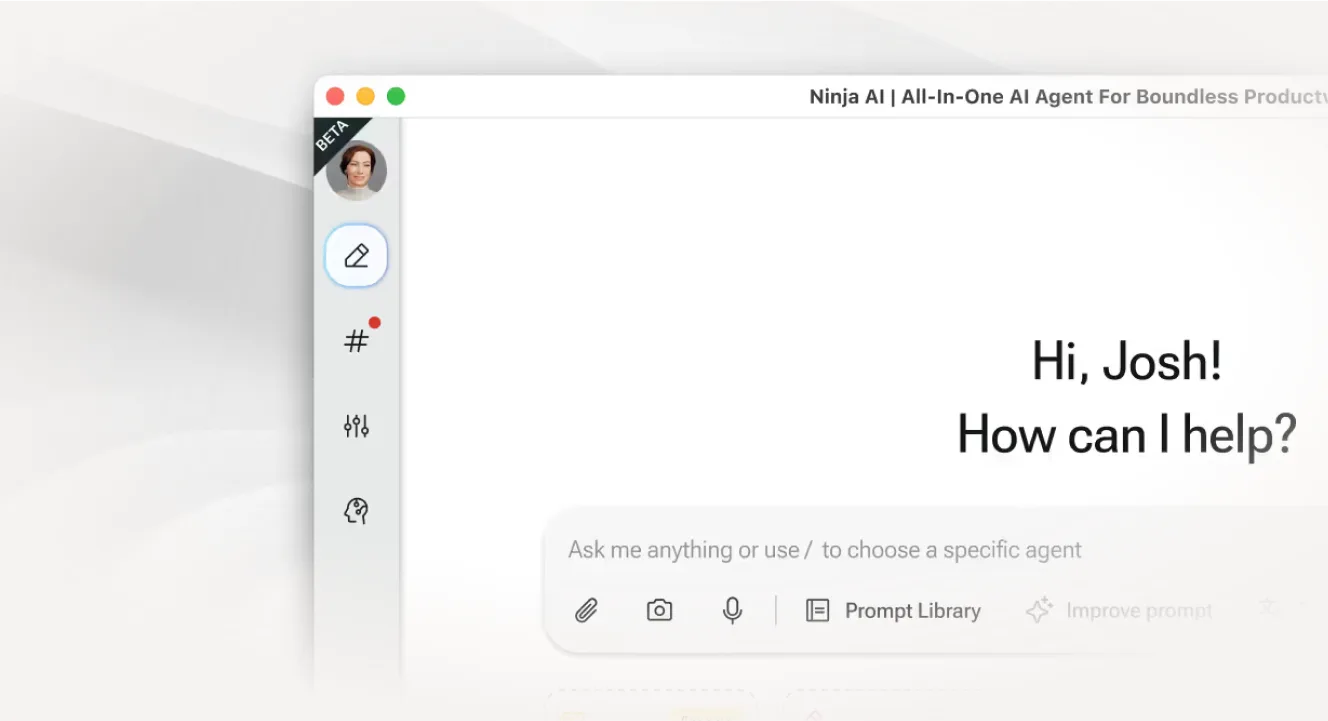
Key benefits and features
Orchestrates 20+ AI models from providers like OpenAI, Anthropic, Meta, and Google
SuperAgent selects the best model for each task to maximize performance and quality
Includes advanced tools like Deep Research 2.0 and SuperAgent-R 2.0 for logic and coding tasks
Powered by next-gen AWS hardware for cost-effective, high-speed performance
Offers a simple, flexible interface for general productivity, research, and coding support
Best for
Individuals, startups, and small teams need an affordable, general-purpose AI assistant to handle a variety of tasks without requiring a complex setup.

Reimagine customer service with AI agents
8. Moveworks
Moveworks offers an enterprise agentic AI for customer support platform built to support the entire workforce. Its AI agents help employees find answers and automate tasks. Powered by multiple LLMs and a reasoning engine optimized for agentic retrieval-augmented generation (RAG), Moveworks connects to hundreds of systems and plugins to deliver results.
The platform’s low-code Agentic Studio allows developers to create and deploy customized AI customer service agents without relying on traditional integration platforms. Moveworks is also the only agentic AI provider listed in the FedRAMP® Marketplace, making it suited for highly regulated industries that prioritize AI security and AI compliance.
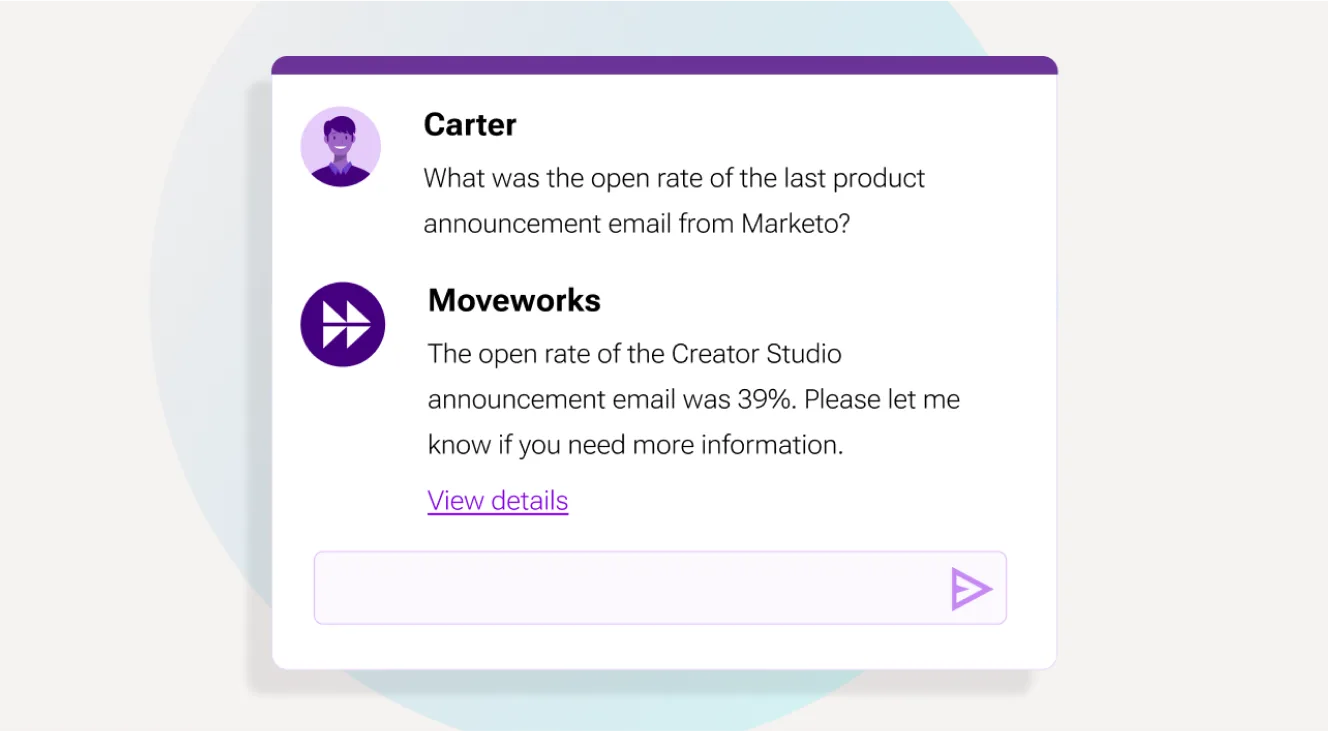
Key benefits and features
Unified AI assistant for answering questions, automating tasks, and building custom agents
Powers agentic RAG across systems, formats, and domains
End-to-end task automation with 100+ integrations and support for multiple LLMs
Low-code Agentic Studio enables scalable agent development without iPaaS
FedRAMP® authorized platform designed for secure, compliant enterprise deployments
Best for
Enterprises that want to streamline internal support, reduce busywork, and scale AI agents securely across their organization to boost productivity and accelerate operations.
9. Decagon
Decagon is a conversational AI platform that helps businesses deliver AI for customer service through AI agents. Its platform lets teams build, manage, and scale agents without relying on rigid scripts or decision trees. Their agents resolve issues across multiple channels, including chat, email, and phone.
Decagon integrates with existing systems, knowledge bases, and workflows, allowing teams to launch without heavy lifting. Its AI copilot supports human agents by handling repetitive tasks and learning from interactions over time. Built-in analytics also provide AI-powered insights to uncover patterns, identify anomalies, and continuously improve support operations.
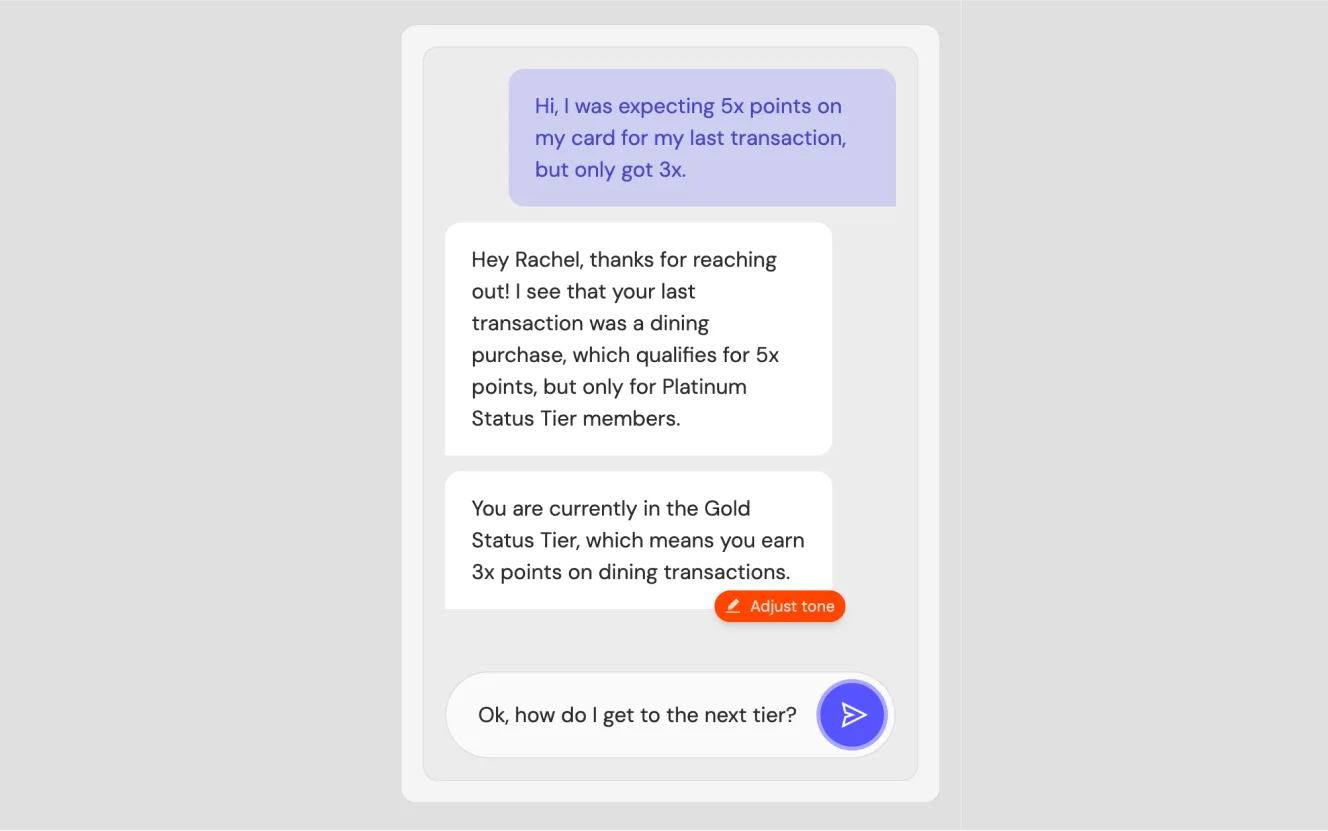
Key benefits and features
AI agents handle real customer issues across chat, email, and phone
Agent Operating Procedures (AOPs) make it easy to build and scale agents
Seamless integration with knowledge bases, workflows, and existing tools
AI copilot supports human agents and improves through continuous learning
AI-powered insights highlight patterns, anomalies, and optimization opportunities
Best for
Customer support teams that want to improve customer experience and resolve issues more efficiently across channels using AI agents that can take action and adapt over time.
10. Aisera
Aisera’s agentic AI platform enhances employee and customer support through intelligent automation and agent augmentation. Agent Assist supports human agents by generating context-aware responses, case summaries, and actionable recommendations using domain-specific LLMs. By embedding these capabilities directly into tools like Salesforce, ServiceNow, Zendesk, and Jira, Aisera ensures agents stay productive without needing to switch systems.
The platform includes Intelligent Swarming, which routes complex issues to cross-functional experts using tools like Slack or Teams. Aisera’s platform also delivers real-time sentiment analysis, dynamic ticket creation, and automated wrap-ups, enabling faster support with less overhead.
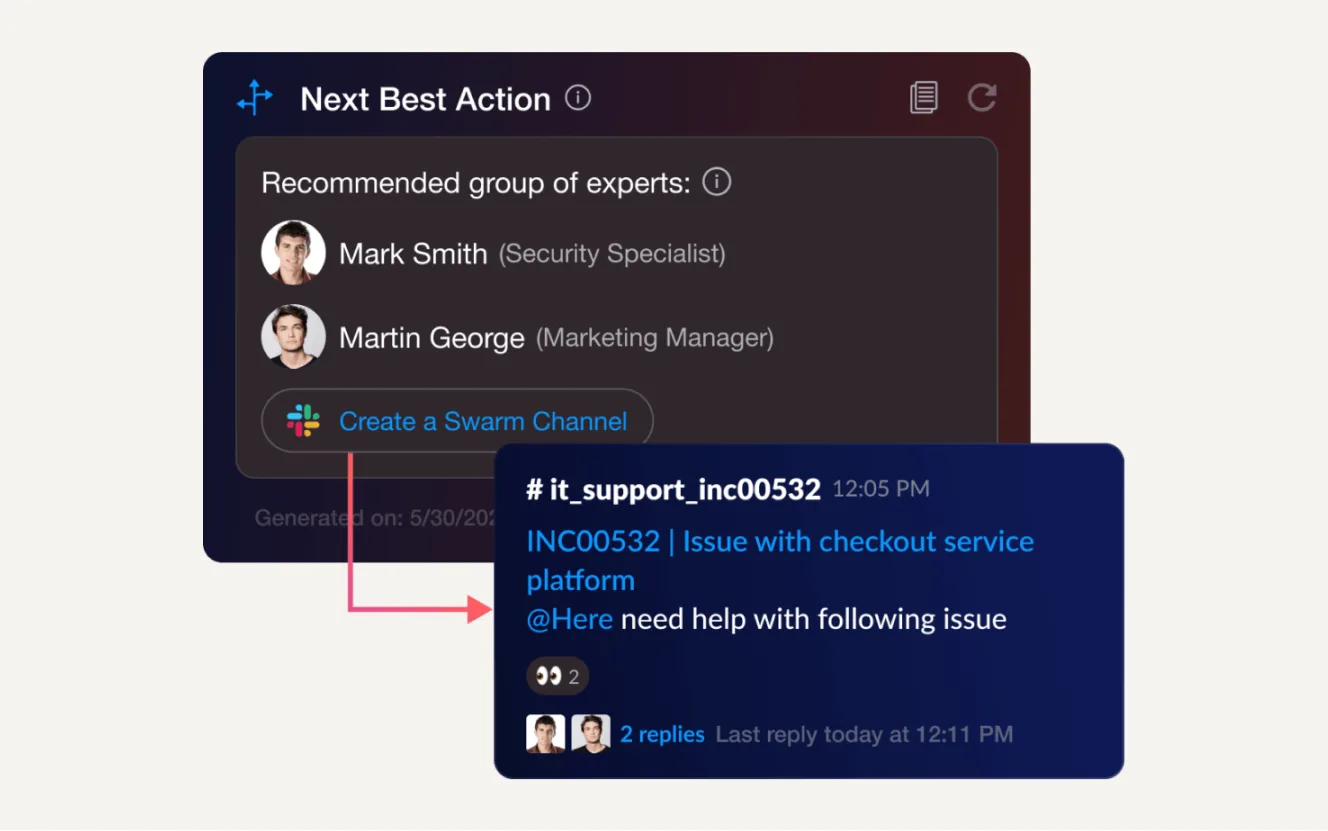
Key benefits and features
Agent Assist generates summaries, suggested responses, and next-best actions using domain-specific LLMs
Embedded directly into platforms like Salesforce, Zendesk, and ServiceNow
Intelligent Swarming enables expert collaboration across departments in real time
User insights detect sentiment and help auto-escalate critical issues
Automatically generates knowledge articles and wrap-ups to streamline documentation
Best for
Enterprises that want to streamline support operations and scale service delivery by automating repetitive tasks and enhancing human agent productivity across departments.
11. Sierra
Sierra offers a full-stack conversational AI platform for customer service teams that want to deliver real-time AI customer service across every channel. Sierra’s platform enables teams to build, orchestrate, and scale AI agents that can perform tasks such as helping customers make an exchange or update a subscription.
The platform supports voice, chat, email, SMS, and messaging channels. Sierra’s Knowledge Engine also integrates FAQs, policies, documentation, and other sources so AI agents can respond with contextual accuracy. When needed, intelligent routing and auto-generated summaries enable smooth escalation to human agents.
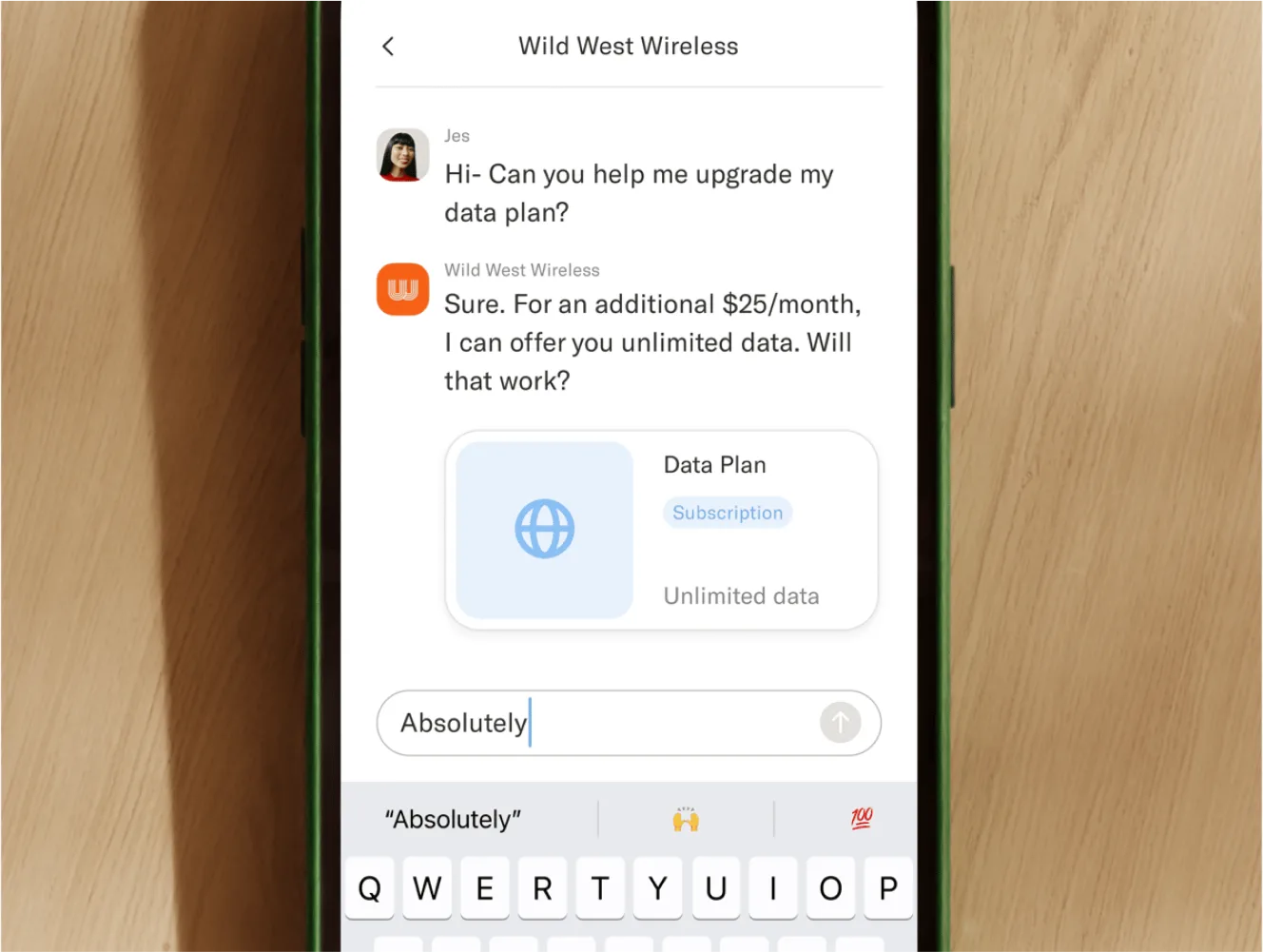
Key benefits and features
Enables teams to build and orchestrate AI agents for complex, multi-step workflows
Omnichannel deployment supports chat, voice, SMS, email, and messaging
Guardrails allow flexible workflow design aligned to brand tone and goals
Integrates internal systems and knowledge sources for real-time action and context-aware responses
Secure with strict data privacy practices and role-based access
Best for
CX teams that want to build and deploy conversational AI agents to automate real-time AI customer care across channels while maintaining brand consistency.
12. Beam AI
Beam is an agentic AI platform designed to automate business operations through self-learning AI agents. Built for enterprise companies, Beam supports agentic process automation by deploying multiple AI agents that work together to optimize workflows, reduce operational overhead, and improve output quality.
The platform uses a modular architecture and advanced learning systems to help agents adapt to changing business demands in real time. To accelerate deployment, Beam offers a comprehensive library of pre-configured agents tailored for specific business functions. These ready-made agents cover a wide range of use cases, including customer service, data extraction, financial operations, and healthcare workflows.
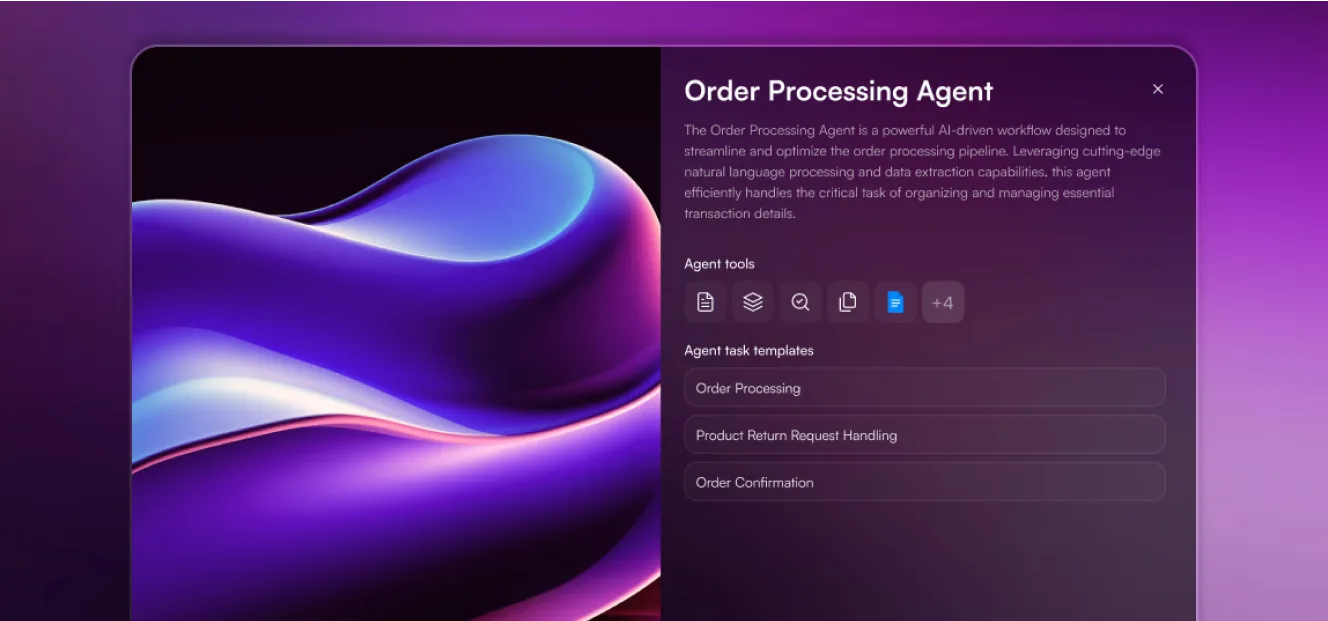
Key benefits and features
Self-learning AI agents continuously optimize task execution
Agentic workflows adapt in real time to shifting operational demands
Multi-agent coordination enables comprehensive, cross-functional automation
The modular architecture integrates AI for customer service with enterprise systems to streamline end-to-end processes
Built for scale, speed, and reliability across complex operational environments
Best for
Operations and IT teams that want to reduce manual overhead and improve efficiency by deploying AI agents that automate and adapt across business functions.
13. AgentOps AI
AgentOps AI is a developer-first platform for building, testing, and monitoring AI agents and LLM applications. Designed for teams working with frameworks like OpenAI Agents SDK, CrewAI, AutoGen, and LangChain, AgentOps brings full visibility and control to the agent development lifecycle.
The platform offers time travel debugging, real-time observability, and comprehensive logging across multi-agent interactions, tool usage, and LLM outputs. With integrations for 400+ LLMs and frameworks, AgentOps helps developers quickly move from prototype to production. It also includes tools for token usage tracking, cost visualization, and even fine-tuning, allowing teams to optimize performance and reduce model spend.
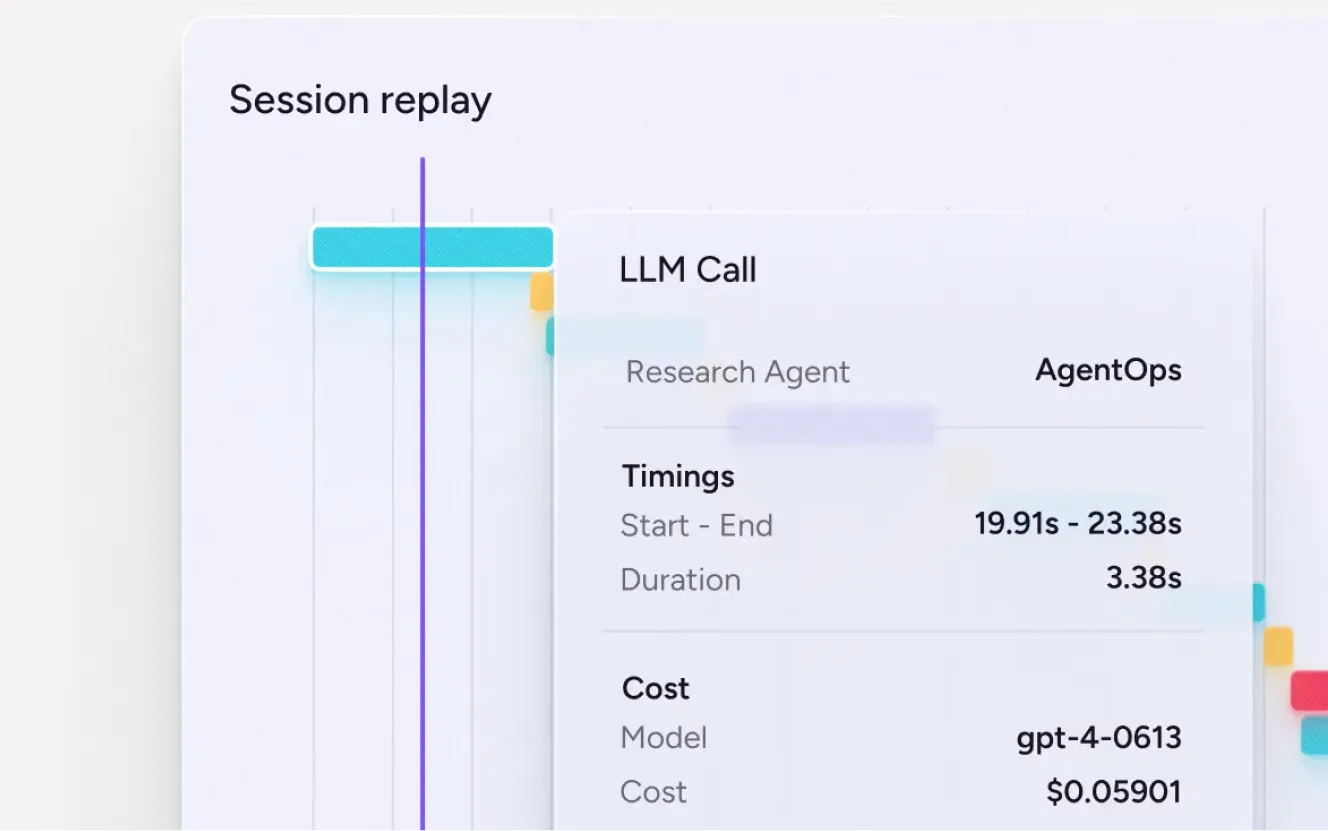
Key benefits and features
Visualize and debug agent runs with timeline-based “time travel” tooling
Track every token, LLM call, tool invocation, and multi-agent interaction in real time
Integrates with leading frameworks like OpenAI SDK, CrewAI, AutoGen, and LangChain
Provides full audit logs, error tracking, and protection against prompt injection attacks
Monitors agent costs and enables cost-effective fine-tuning on saved completions
Best for
Engineering teams working with LLMs and agent frameworks that need observability, cost tracking, and debugging tools to build and maintain reliable, scalable AI agents.

Automate customer service with AI agents
How to pick an AI agent company for your business
Choosing the right AI agent company isn’t just about features. It’s about finding a partner that fits your goals, technical capacity, and long-term strategy. Whether you’re a startup experimenting with AI customer service automation or an enterprise deploying agents at scale, here’s how to evaluate agentic AI platforms.
Step 1 - Define your use case
Before diving into demos or product comparisons, get clear on what problem you want AI agents to solve. Are you looking to automate customer service workflows, streamline internal operations, scale agentic commerce, or accelerate engineering tasks? Do you need an agent that can handle external interactions with customers, or one that operates behind the scenes on internal systems?
Different platforms specialize in different areas. Having a defined use case like helps you quickly narrow your options and focus on the capabilities that matter most to your business.
Step 2 - Assess technical fit
Agentic AI platforms vary in complexity. Some are designed for non-technical users and offer no-code or low-code tools for building and launching AI agents. Others require more hands-on engineering to integrate with APIs, configure workflows, and manage behavior.
Consider your team’s technical capacity and bandwidth. If your operations or CX teams need to deploy agents without heavy reliance on engineering, look for intuitive tools and no-code AI agent builders. If you have an in-house dev team ready to experiment, a platform with more flexibility might be a better fit.
Step 3 - Look for scalability
You may start with one or two use cases, but if agentic AI proves valuable, you’ll likely want to scale it across other departments. Choose a platform that supports multi-agent systems, centralized control, and role-based permissions. Consider whether the infrastructure can handle growing volumes of interactions and support advanced use cases down the line.
Step 4 - Check channel support
Think about where your users are and whether the platform can support them there. If you're deploying AI agents for customer service, ensure the platform works across key communication channels like in-app chat, web, email, SMS, or voice. Omnichannel capabilities help ensure continuity and a consistent experience across touchpoints. For an even more seamless experience, look for omnipresent AI agents that operate across channels while retaining context and memory to to support users more efficiently across interactions.
Step 5 - Evaluate control, security, and compliance
Data privacy, access control, and security aren’t optional, especially for industries like healthcare, finance, or enterprise IT. Look for platforms that offer enterprise-grade messaging structure, audit logs, data governance controls, and compliance with standards like SOC 2, HIPAA, or GDPR.
You’ll also want to know how much control you have over agent behavior. Can you define guardrails? Tune tone and voice? Feed in company-specific knowledge? These factors can impact trust and performance.
Step 6 - Consider strategic support
Agentic AI isn’t a plug-and-play solution. The best AI agent companies offer more than just technology. They also offer guidance on developing and deploying an effective AI strategy. Look for companies that provide onboarding support, help you define success metrics, and work with you to adapt AI agents over time.
What sets the best AI agent companies apart
The top AI agent companies deliver platforms that are adaptable, secure, compliant, and ready to scale across real business environments. They offer flexibility for technical and non-technical teams alike, strong integration capabilities, and a thoughtful approach to data control, governance, and long-term strategy.
As more companies experiment with agentic automation, success will depend not just on the technology's power but also on how well it fits your team, your workflows, and your goals.
Sendbird’s AI agent platform and AI agent builder can help your team deploy intelligent, scalable AI for customer service without the need for complex infrastructure or heavy engineering resources. Whether you're looking to elevate your customer experience or streamline internal operations, our tools and AI experts are here to help.
Contact our team of AI experts to learn more.











